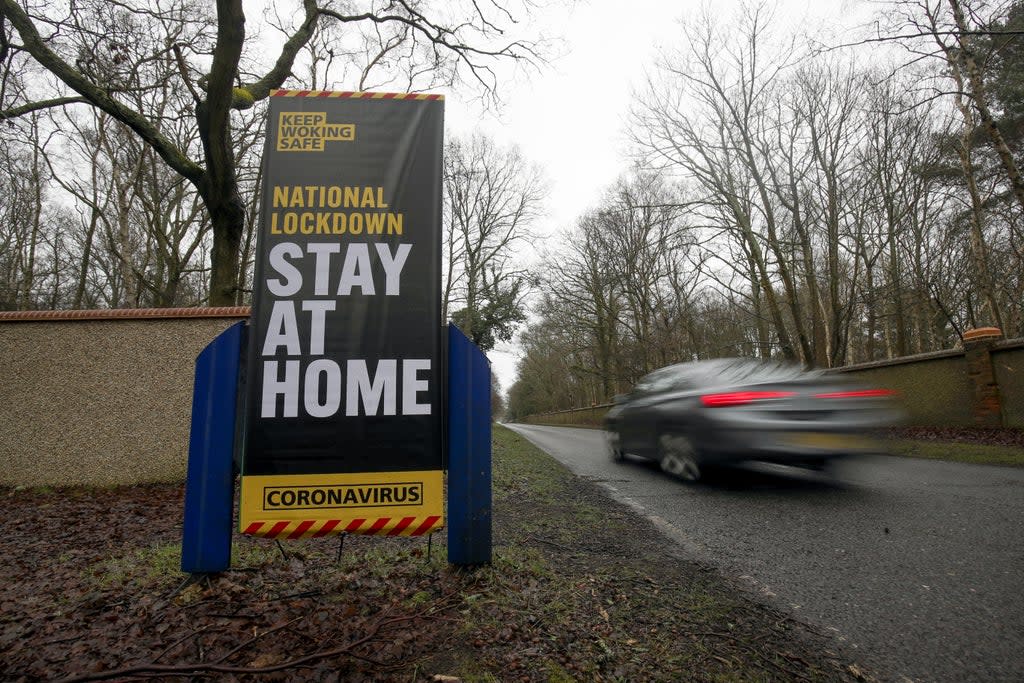Wellbeing in UK ‘among lowest levels on record’ during second wave of virus

Personal wellbeing in the UK fell to near-record low levels during the second wave of coronavirus, while young adults are still struggling to recover from the worry of the pandemic, a new survey suggests.
Scores for happiness and life satisfaction in late 2020 and early 2021 were among the lowest since figures were first collected a decade ago, with anxiety ratings climbing to a new high.
Wellbeing levels showed signs of improving by the middle of this year, however.
The survey has been compiled by the Office for National Statistics (ONS) and is based on scores collected from a sample of people aged 16 and over.
Waves 1 and 2 of the #COVID19 pandemic saw UK well-being levels among the lowest since 2011.
However, measures of happiness, anxiety, and feeling that things done in life are worthwhile improved to pre-#COVID19 levels by Quarter 2 (Apr to June) 2021 https://t.co/9Fb9rdpXui pic.twitter.com/vNqm5P3pm6— Office for National Statistics (ONS) (@ONS) December 8, 2021
Participants were asked to rank their levels of wellbeing on a scale from 0 and 10.
When people were asked in October to December last year how happy they felt ‘yesterday’, where 0 indicated ‘not at all happy’ and 10 ‘completely happy’, scores averaged 7.23 – the lowest since the ONS began the survey in 2011.
This period coincided with the start of the second wave of the virus, and was followed in January 2021 by the introduction of another nationwide lockdown.
Happiness scores for the first three months of this year averaged 7.26 out of 10, but rose to 7.52 between April and June, in what the ONS describes as a “bounce-back” in “all personal wellbeing measures”.
During this period lockdown restrictions were eased while the rollout of Covid-19 vaccinations, which had begun at the end of 2020, was accelerated to reach all adults by the end of June.
A similar pattern is evident in ratings for life satisfaction.
When asked ‘how satisfied are you with your life nowadays’, where 0 was ‘not satisfied at all’ and 10 ‘completely satisfied’, scores for January to March 2021 averaged 7.28 out of 10 – the lowest on record.
But this was followed by a jump to 7.55 for April to June.
Most age groups reported improvements in life satisfaction, happiness and anxiety by Quarter 2 (Apr to June) 2021.
This excluded
▪ 16 to 24 year-olds
▪ 35 to 39 year-olds
▪ 85 years and over
➡️ https://t.co/FEV94UxlKQ pic.twitter.com/znQ8MV4szK— Office for National Statistics (ONS) (@ONS) December 8, 2021
Asked ‘how anxious did you feel yesterday?’, where 0 was ‘not at all anxious’ and 10 ‘completely anxious’, the average score for October to December last year hit a record high of 3.43, then fell back this year to 3.23 in January-March and 3.04 in April-June.
The drop in anxiety was “notable for people aged between 50 to 59 and 65 to 74 years, perhaps indicating a sense of optimism as vaccines continued to roll out”, the ONS said.
Most age groups reported improvements in life satisfaction, happiness and anxiety by the middle of this year.
This did not include young adults, 35 to 39-year-olds and people aged 85 and over, however.
Anxiety levels among 20 to 24-year-olds in April to June 2021 were “significantly higher” than the national average – a change from the “characteristic trend of anxiety over a lifetime”, which tends to peak in the ages 45 to 59.
“Employment rates among young people have been the most affected by coronavirus, while those aged 16 and 24 years were most likely to experience so-called lockdown loneliness in the early months of the pandemic,” the ONS added.
Read More
UK alcohol deaths hit new high after biggest year-on-year increase
Covid-19 weekly deaths among over-80s lowest for nearly two months

 Yahoo News
Yahoo News 
